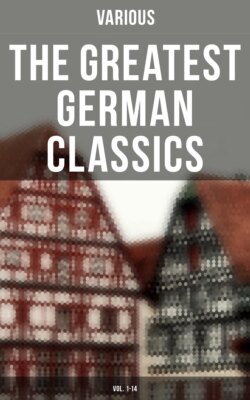Читать книгу The Greatest German Classics (Vol. 1-14) - Various - Страница 37
На сайте Литреса книга снята с продажи.
INTRODUCTION TO HERMANN AND DOROTHEA
ОглавлениеTable of Contents
Hermann and Dorothea is universally known and prized in Germany as no other work of the classical period of German literature except Goethe's Faust and Schiller's Wilhelm Tell, and, although distinctively German in subject and spirit, it early became and is still a precious possession of all the modern world. It marks the culmination of the renaissance in the literary art of Germany and perhaps of Europe.
Schiller hailed it as the pinnacle of Goethe's and of all modern art. A. W. Schlegel in 1797 judged it to be a finished work of art in the grand style, and at the same time intelligible, sympathetic, patriotic, popular, a book full of golden teachings of wisdom and virtue. Two generations later one of the leading historians of German literature declared that there is no other poem that comes so near to the father of all poetry (Homer) as this, none in which Greek form and German content are so intimately blended, and that this is perhaps the only poem which without explanation and without embarrassment all the modern centuries could offer to an ancient Greek to enjoy. In the view of the end of the nineteenth century, expressed by a distinguished philosopher-critic, this work is a unique amalgam of the artistic spirit, objectivity, and contemplative clearness of Homer with the soul-life of the present, the heart-beat of the German people, the characteristic traits which mark the German nature.
As Longfellow's Evangeline, treating in the same verse-form of the dactylic hexameter and in a way partly epic and partly idyllic a story of love and domestic interests in a contrasting setting of war and exile, was modeled on Hermann and Dorothea, so the latter poem was suggested by J. H. Voss' idyl Luise, published first in parts in 1783 and 1784 and as a whole revised in 1795. Of his delight in Luise Goethe wrote to Schiller in February, 1798: "This proved to be much to my advantage, for this joy finally became productive in me, it drew me into this form (the epic), begot my Hermann, and who knows what may yet come of it." But Luise is not really epic; it is without action, without unity, without any large historical outlook—a series of minutely pictured, pleasing idyllic scenes.
In contrast herewith Goethe's purpose was in his own words, "in an epic crucible to free from its dross the purely human existence of a small German town, and at the same time mirror in a small glass the great movements and changes of the world's stage." This purpose he achieved in the writing of Hermann and Dorothea at intervals from September, 1796, through the summer of 1797, in the autumn of which year the poem was published.
The main sources from which the poet drew his material are four. In the first place the theme was invented by him out of an anecdote of the flight of Protestant refugees from the Archbishopric of Salzburg in 1731–1732. On the basis of this anecdote he drew the original outlines of the meeting and union of the lovers. Secondly, as a consequence of the French Revolution, Germans were forced to flee from German territory west of the Rhine. Goethe was present with Prussian troops in France in 1792, and observed the siege of Mainz in 1793. Hence his knowledge of war and exile, with their attendant cruelties and sufferings. Thirdly, the personal experiences of his own life could not but contribute to his description of the then German present. Features of Frankfurt and Ilmenau reappear. The characters show traits of Goethe's parents, and possibly something of his wife is in Dorothea. Hermann's mother bears the name of the poet's and reveals many of her qualities. But some of these are given to the landlord-father, while the elder Goethe's pedantry and petty weaknesses are shown in the apothecary. The poet's experiences in the field are realistically reproduced in many particulars of character and incident, as are doubtless also his mother's vivid reports of events in Frankfurt during July and August, 1796. We may feel sure too that it was the occurrences of this summer that led Goethe to transform the short, pure idyl of his first intention into a longer epic of his own present. The fourth source is literary tradition, which we may trace back through the verse idyl of Voss to the prose idyl of Gessner, thence through the unnatural Arcadian pastorals of the seventeenth and earlier centuries to the great Greek creators—Theocritus, of the idyl, and Homer, of the epic.
From whatever source derived, the materials were transmuted and combined by Goethe's genius into a broad, full picture of German life, with characters typical of the truly human and of profound ethical importance, interpreting to the attentive reader the significance of life for the individual, the family, the nation.
